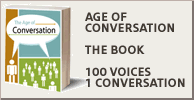

Results for articles with tag 'amazon' (6 total)

Here's another good example of a huge brand creating an experience that fits the iPad.
Amazon is clearly keen to push itself into a number of channels and has already had massive success with mobile.
With its new iPad application, it demonstrates an understanding of "the lean back" experience by translating the Amazon experience into a "Window Shopping".
It creates a fantastic browsing experience that allows the user to move rapidly through items and complete transactions.
It's further proof that the iPad offers brands an opportunity to create an experience with users that's fundamentally different from a typical website. With the growth of the iPad, brands can't ignore this area of development.
Posted by Ed Cotton
Flash sales sites seem to have what it takes to get recession weary shoppers to open their wallets and part with their cash. This is all about the "deal" and the genius of the sites is to make it easy for consumers to get access to exclusive products and knock down prices. The model works because of the limited-time nature of these offers and the understanding among shoppers that quantity is limited.
Gilt Group seems like an apt name, given that they are really in the business of making luxury shopping a "guilt-free" experience. There are no bags to be seen with, no hard to find sample sales to locate and the massive discounts on well-respected brands can clearly be identified and seen.
in today's retail environment, promotion is the name of the game and retailers aren't getting traffic into the stores with out it. There has to be a major reason for consumers to go into the store in the first place. They've become highly strategic and are masters of sniffing out great deals.
The power of the flash sale is that is forces consumers to make decisions and to buy. The interesting part, one that's currently under-developed, is the gaming aspect. There's a certain competitiveness that's part of the attraction- people don't want to miss out and there are several ways this might manifest itself.
We are certainly at the early stages of the development of the flash sale category,I expect we will soon see these tactics deployed by a host of retailers with their online stores, in addition to the emergence of a whole of host of new players beyond Gilt Group.
Posted by Ed Cotton
Here are some of the key points:
1. Always imagined Zappos as selling more than shoes- used Virgin as a model, but instead of being all about being "hip and cool", Zappos wanted to be about the best service.
2. The board wasn't all behind the brand's unique corporate culture, many thought it was some kind of crazy experiment. The majority of the board wanted the company to focus on profitability and they couldn't see the connection between this and culture.This caused serious tensions and the only possibility for founder Tony Hsieh was to buy out the board at the likely cost $200 million.
3. The company explored various options, but followed up with Amazon who they had met back in 2005. In 2009, Hsieh presented to Bezos, he instantly got the core Zappos selling point, its culture.
4. Amazon closed the Zappos deal on November 1st at a valuation of $1.2 billion.
5. Zappos benefits from Amazon's understanding of its culture and they are starting to share ideas.
6. Zappos operates independently, but the relationship is governed by a document that recognizes the uniqueness of Zappos's culture and the responsibility of Amazon to protect it.
7. The deal appears to be working- in the first quarter of 2010- net sales were up 50%.
8. As it grows, it's even more important for Zappos to protect its unique culture and they are taking steps to do this, by tracking cross departmental relationships and encouraging employees to look at photos of random employees and asking them how well they know them.
There are a number of critical points that come out of this experience and it seems obvious that many of the money guys just don't get the soft intangibles that make all the difference to a brand, they seem unable to draw the correlation between the two.
Perhaps, the advocates, supporters and creators of these soft intangibles need to do a better job of linking these to financial performance. The other important thing this story shows is the importance of a strong leader who has a point of view and a belief system.
Posted by Ed Cotton
It appears the experts where on a “lunch break” when we needed them most.
Perhaps the world has gotten too complex for experts and they need to band together in complex neural nets to have a grasp of what’s happening.
In other areas, it also seems that experts aren’t all that they appear to be. In a new era of community participation, individuals can emerge as de-facto experts, providing them have the ‘chops” and are seen by the community to be making valid contributions.
The concept has considerable appeal because they appear to have the “secret sauce” of objectivity. Amazon is often sited as the best example of this community of experts, where reviews are given great currency and can be massively persuasive in generating sales. However, according to Slate, these critics appear to be suffering because they have stressful full-time jobs, they’ve become the people they were supposed to replace and their skills and objectivity have to be called into question.
"However, by refashioning Web 2.0 as a proprietary marketplace, Amazon's reviewer rankings subject enthusiasts like Grady Harp to the same pressures that confront the professionals they were supposed to replace. To keep writing, lest another reviewer usurp one's spot. To say something nice, in hopes that someone will say something nice about you. And to read for work, rather than for pleasure. "I have a tall stack of books staring at me," Harp wrote, in a wistful moment."
When it becomes a job, who are they working for?
In fact, the world of the customer review has become a business, you can by a “plug and play” system for your website or brand to help bring that supposedly valued objectivity.
Everywhere you look it appears the expert is in trouble, bothered by a world that’s now too complex for them to understand or in danger of loosing their objectivity because they are bowing to commercial pressures.
In an expertless world, who should we be listening to?
Posted by Ed Cotton
There was a school of thought that said some of the billions should and might be shared amongst those who created the content in the first place.
There was obviously something of a disparity between the billions of dollars paid for a brand like YouTube, compared to the zero revenue that the creators were getting.
Critics also pointed figures at Digg for the same reason.
Of course, everyone was barking up the wrong tree; there's a big difference between valuation/purchase price and advertising revenue.
Now, on some sites, like YouTube, creators are getting a small slice of advertising revenue.
However, for most creators of content and given that "most" now includes people who put photos up on a Facebook page, there's no financial reward, just the warm glow of social connectivity.
So is this new world one where participants get zero reward for their efforts?
It looks as if some companies are looking to change this and bring in merit badges and virtual/"fools gold".
Amazon has a newish site called Askville...
"Askville is a place where you can share and discuss knowledge with other people by asking and answering questions on any topic. It’s a fun place to meet others with similar interests to you and a place where you can share what you know. You can learn something new everyday or help and meet others using your knowledge. Askville even helps you learn by giving you cool tools to help you find information online while you are answering questions. It’s all about sharing—what you know and what you want to know—so go ahead and meet someone new today and Askville!"
Answer questions on Askville and you will be given Quest Gold, which Amazon is only too happy to state is currently worth even less than the US dollar.
"Except for any special limited time redemption offers that we may make available from time to time, Quest gold are not redeemable for anything at this moment. Once Questville.com launches we hope to have exciting new ways to use your Quest gold. Until then, keep on stocking up on your Quest gold!"
People are going to be submitting answers and contributing content for the benefit of some potentially worthless virtual currency, albeit with the very cool name of Quest Gold.
The important thing to consider here is that while the currency has no material value, it still works rather well as a merit system.
It's much better than nothing because people like points systems, they can compare and compete and get some sort of satisfaction from that.
It's likely that we will see more merit and point systems around the social networks this year.
It's now time to forget the dreams of wealth sharing from Web 2.0 and instead realize the best thing the majority of content creators can expect for their efforts, is some virtual currency and a merit badge.
Via GigOm
Posted by Ed Cotton
The results are somewhat suprising- despite living in a DVR world, only 7% would prefer to eliminate them, less than 2% would prefer to eliminate magazine or newspaper ads. They also found these traditional forms of media more worthwhile, than Amazon recommendations.
Less worthwhile and in-line for elimination; telemarketing, spam and pop-up ads that were rated more "evil' than spam.
Via Bankwatch
Posted by Ed Cotton
Articles for tag amazon (6 total).
